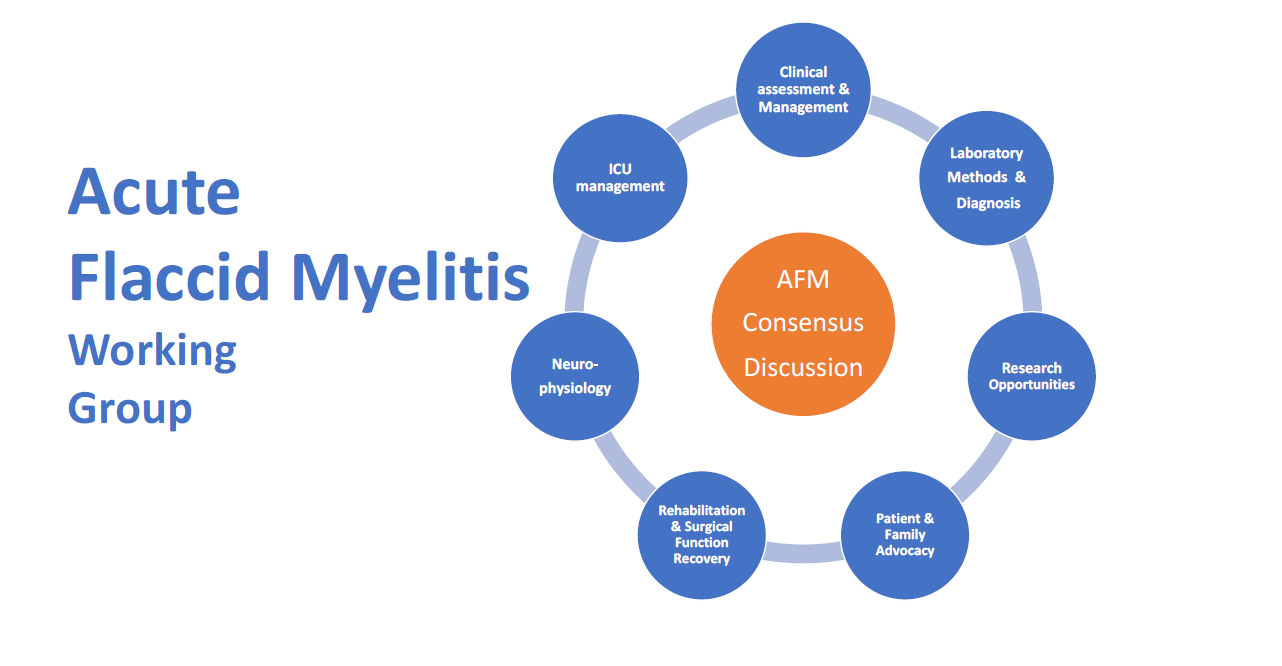Who we are?
The AFM Working Group was established in North America in September 2018 in response to the emergence of AFM as a disabling disease representing a significant public health threat. With a total of 131 group members, it encompasses a wide range of relevant specialties including neurology, pediatrics, infectious diseases, critical care medicine, surgery, and physical medicine & rehabilitation, as well as scientists with expertise in epidemiology, genetics, virology and immunology, and representatives from the patient community.

This year’s AFM Virtual Symposia Series provided a comprehensive update about Acute Flaccid Myelitis (AFM) focused on education and clinical preparedness in the setting of emerging and re-emerging viral disorders. A list linking to recordings of the lectures from the symposia series can be accessed on our Educational Resources page.
Our Mission
The mission of The AFM Working group is to develop, generate consensus, and share knowledge about the disease for the welfare of individuals diagnosed with AFM in the United States and around the world.
Our Vision
Address the knowledge gap on the current understanding of AFM, encourage and advance research endeavors, and improve the quality of life of the AFM community.
AFM Physician Consult and Support Portal
If you suspect a case of Acute Flaccid Myelitis (AFM) and would like to schedule a consult with neurologists and/or infectious disease experts specializing in AFM, please complete the form at the link below. We will help set up a peer to peer phone call for clinical support from AFMWG physicians.
Click here to submit a request.
Updates on Enterovirus and AFM activity
AFM Working Group monthly meetings
The AFM Working Group meets monthly for townhall meetings and panel discussions on updates in enterovirus and AFM activity around the world. Recordings of these meetings are accessible through the Virtual Meetings page.
Poliomyelitis in NY: A review by Professor Vincent Racaniello
Prof. Vincent Racaniello from Columbia University provided an excellent update about poliomyelitis on July 22, 2022. Click here for the update.
Objectives and Goals
- Develop and share up to date information of the epidemiology, natural history, disease mechanisms, and clinical aspects of AFM
- Bring together an interdisciplinary community of experts with a common interest in AFM to enrich the discussions and reach consensus on the different aspects of the disease
- Provide guidance to physicians and health care providers across the globe in the diagnosis, clinical assessment, acute management, and long term care of patients affected by AFM
- Conduct collaborative research to learn about a relatively rare but disabling condition
- Raise awareness and educate the community on AFM to increase our preparedness for potential upcoming outbreaks
- Publish basic science, translational and clinical research papers that enhance understanding of AFM
- Publish consensus diagnostic criteria and clinical guidelines for acute management and rehabilitation
- Organize educational symposiums and webinars for both the healthcare and parents’ communities
- Enrollment of individuals diagnosed with AFM and families in ongoing and future research studies
- Preserve partnership and frequent communication with the Centers for disease control AFM Surveillance Team and the National Institutes of Health
- Preserve partnership and frequent communication with patient advocacy organizations such as the Siegel Rare Neuroimmune Association (SRNA) and the AFM Association.

